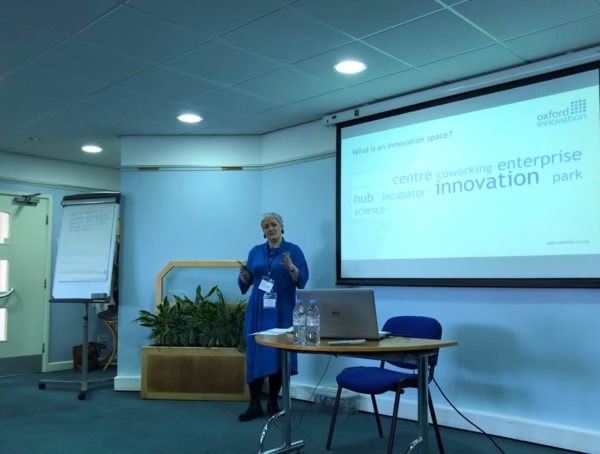Participants shared relevant experiences and one delegate, who had recently visited Boston, commented that innovation spaces there are consistently regarded as an essential part of strategic economic planning. US policy makers see a clear correlation between the development of innovation spaces to nurture ambitious businesses, and the resulting positive impact on growth, solutions to societal challenges and improved productivity.
Led by Elaine McKechnie, Oxford Innovation’s Business Development Director, delegates were split into three groups to discuss a range of deeper topics:
- Is it important that innovation spaces are recognised by the public and private sectors as ‘different’ from other types of space?
During the last decade, the property market has been through something of a transformation in its approach. Gone are the days of a handful of types of space on the market, each designed with one customer type in mind. It could be likened to the car market, where buyers would choose between a hatchback, saloon or estate, depending on how big their family was. Today, the range of car types is tricky to fit in to segmented categories, and the property market is similar - incubators, innovation centres, serviced offices, managed workspace, co-working spaces, science parks, hot-desking…the list goes on. And where do accelerator programmes sit? Perhaps they are the equivalent of sports cars – fun and rewarding, but you need a sensible day to day base as well.
The group concluded that a clear and agreed definition of ‘innovation space’ - and the various subsets within it - would benefit the majority of UKSPA members and their various stakeholder networks. It would provide a means of classification and a point of reference to policy makers and funders, making it easier to compare like for like. It would also allow more straightforward communication with potential occupiers, helping them to make more informed decisions based on their short and long-term needs.
- With the emergence of commercial co-working spaces, how do we ensure sustained financial support for true innovation spaces?
True innovation spaces typically suppress profits in the short term to invest in the availability of specialist facilities and / or good quality business support that will deliver faster business growth in the medium term and wider innovation and regeneration-based benefits.
The group debated the role of the private sector in the provision of innovation spaces – particularly those that provide free space. Do these provide a realistic environment for sustained business growth, which will contribute towards long term economic growth?
A strong theme emerging from this group discussion centred on the need for a mixture of capital and revenue to create innovation spaces. The former is obvious, but on that basis, generally easier to secure, relatively speaking. The latter is always more challenging to secure and yet fundamental to creating the eco-system needed for high quality business support associated with innovation space.
- How do we design our space and support to ensure companies are supported through the whole journey, not just the start-up phase?
This group agreed that along with flexibility, critical to the success of innovation spaces is the provision of collaboration space; areas where individuals and teams can come together to share and co-create in a trusted environment, often facilitated by growth advisors.
All in the group recognised the challenges that occupiers face during the growth journey: needing more room to expand but the move to more traditional lease options presents a daunting step - if in fact, there is suitable space available locally. One of the participants reflected on their own ‘Mind the Gap’ meetings undertaken with occupiers as they were leaving, and the ‘eye-opening’ impact it has had with some.
The journey to grow on space should be better defined and readily available, sitting as part of the broader innovation space strategy for a region.
There were three key takeaways from the discussion forum for the industry:
- We, as an industry, need to articulate the unique offer of innovation spaces to the UK’s economic growth, over and above purely ‘managed workspace’ – a definition that can be understood by policy makers, funders and occupiers alike.
- True space to innovate will deliver long term financial and economic benefits but securing the right funding to create such space is key.
- In designing our spaces and support, at their core should be the creation of truly collaborative environments with targeted and tailored business support.
Oxford Innovation is the UK’s leading operator of innovation spaces and is recognised as a thought leader for the industry. If you would like to find out more about what we do, please click here.




